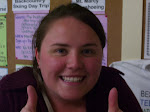The idea behind this project was to emphasize the lack of control low-income individuals and families have over their lives. The simulation works like this: participants are randomly assigned a family role ranging anywhere from a member of a family of four to living as a single senior citizen. The participants then have to "survive" a month; making sure bills get paid, the kids get to school, and, of course, avoiding (as much as possible) being oppressed by the system.
Obviously this activity is inherently flawed because nothing can simulate the fear and stress of those struggling to make ends meet, but it is a good prompt for productive conversation.

Sitting down in the background you can see "Servin' it Up's" own Jesse Pyles who, for the second time, took on the role of the Spanish-speaking grocer.
I participated as the Teacher's Assistant. Last time we got together to host the sim I was the teacher and it was the hardest job ever (very true to life if you ask me!). So, this time I assisted one of our volunteer staffers who was the Teacher in this sim.
One of my favorite parts of the whole experience was the talk that was given during the debriefing. A woman from C-CAN, The Center for Communities and Neighborhoods of Burlington, VT, came for the whole event to observe the activity and give a talk that focused specifically on poverty in Burlington. I can't remember her name (sorry!), but she was great and gave realistic advice on how to work on poverty issues in your community.
She explained that the reason she was doing her work in Burlington was because she feels that it is the one place where poverty can actually be eradicated. Because of the size of the population that is in poverty (350 families) and the social-services available in the area, it is realistic to think that poverty in this city can be eradicated.

This is me swooning over this woman's talk!!!! She was great and brought her son...the cutest little baby boy!
As part of her talk she gave a list on what types of environment a child could grow up in in order to help break the cycle of poverty. One that stood out strongly to me was that a kid should be raised in a home with at least 200 books! Perhaps the idea is that familiarizing a kid with books at a young age could possibly make knowledge more approachable later in life. Or, exploring a bookshelf at a young age will help to pique curiosity. Well, whatever the reasons, it will inevitably be the case for my kids.


1 comment:
Only 200 books? I don't know if our household will be able to moderate itself to that extent.
Post a Comment